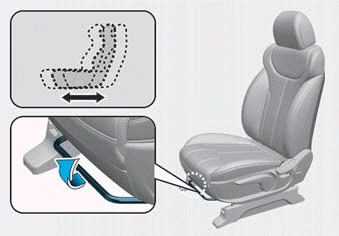Hyundai Palisade: Indicators And Gauges / Repair procedures
Hyundai Palisade (LX2) 2020-2025 Service Manual / Body Electrical System / Indicators And Gauges / Repair procedures
| Removal |
| 1. |
Disconnect the negative (-) battery terminal.
|
| 2. |
Remove the cluster fascia panel (A).
(Refer to Body - "Cluster Fascia Panel")
|
| 3. |
Remove the cluster (A) from the housing after removing screws.
|
| 4. |
Disconnect the cluster connecter (A) and then remove the cluster.
|
| Installation |
| 1. |
Connect the cluster connector.
|
| 2. |
Install the cluster assembly.
|
| 3. |
Install the cluster facia panel.
|
| 4. |
Connect the negative (-) battery terminal.
|
| Inspection |
| 1. |
Check point (Warning indicator)
|
| 2. |
Check point (Gauge)
|
| 3. |
Communication information
|
| 4. |
Other cluster check list
|
Diagnosis with Diagnostic tool
| 1. |
In the body electrical system, failure can be quickly diagnosed by using
the vehicle diagnostic system (Diagnostic tool).
The diagnostic system (Diagnostic tool) provides the following information.
|
| 2. |
If diagnose the vehicle by Diagnostic tool, select "DTC Analysis" and
"Vehicle".
|
| 3. |
If check current status, select the "Data Analysis" and "Car model".
|
| 4. |
Select the 'CLU' to search the current state of the input/output data.
|
CLU Variant Coding
As we have more options (ESC, TPMS, SCC, etc.) in the car, the dashboard now
have more information to display depending on the chosen options.
For this reason, we need to learn which options the current vehicle when we
replace the dashboard.
To address this issue, a course of learning based on the option required for
the vehicle when replacing the dashboard should be carried out.
This is called Variant Coding.
| 1. |
Connect the cable of Diagnostic tool to the data link connector in driver
side crash pad lower panel.
|
| 2. |
Select the 'S/W Management' and 'Car model'.
|
| 3. |
Select the 'Cluster Module' and 'CLU Variant Coding'.
|
Other information:
Hyundai Palisade (LX2) 2020-2025 Service Manual: Drive Belt Tensioner
Repair procedures Removal and Installation • Be careful not to damage the parts located under the vehicle (floor under cover, fuel filter, fuel tank and canister) when raising the vehicle using the lift...
Hyundai Palisade (LX2) 2020-2025 Service Manual: Specifications
Specifications Items Specifications Rated voltage DC 12V Operating temperature range -22 to +176°F (-30°C to +80°C) Rated load Dimmer & passing switch High : 0...
Categories
- Manuals Home
- 1st Generation Palisade Owners Manual
- 1st Generation Palisade Service Manual
- Electrochromatic Mirror (ECM) with homelink system
- Auto Hold
- Check Tire Pressure
- New on site
- Most important about car
Manual adjustment
The front seat can be adjusted by using the levers located on the outside of the seat cushion. Before driving, adjust the seat to the proper position so that you can easily control the steering wheel, foot pedals and controls on the instrument panel.

Copyright © 2025 www.hpalisadelx.com
















































